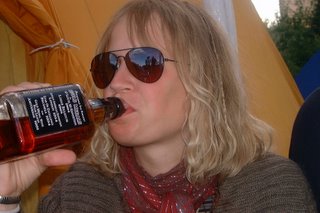
Wynonie Harris, Quiet Whiskey.
Jerry Lee Lewis, It Was the Whiskey Talkin' (Not Me).
Fats Domino, Whiskey Heaven.
Gene Simmons, Drinkin' Scotch.
The Modeps, Whiskey and Soda.
Norman Blake, Whiskey Deaf and Whiskey Blind.
Roscoe Holcomb, Moonshiner.
George Jones, White Lightning.
Blind Blake, Bootleg Rum Dum Blues.
Gwenn Foster and Clarence Ashley, Bay Rum Blues.
Bessie Smith, Me and My Gin.
Champion Jack Dupree, You've Been Drunk.
Nina Simone, Gin House Blues.
Snoop Dogg, Gin and Juice.
Tobin Sprout, Martini.
John Coltrane and Paul Quinichette, Vodka.
The Champs, Tequila.
A Prelude
"In Helena and Great Falls, we stayed at hotels, ordering gin from the bellboy to drink in our rooms. I like the gin quite well, mixed with lemon soda and ice. Nothing to write home about either, though on the drive up to Helena I had had an odd experience.
As usual, we had a bottle of moonshine with us when we started out and we passed it back and forth, as usual, while we drove along. The road was rough and once, when it was my turn, I spilled a few drops on my silk stockings. That night when we were changing for dinner I found little holes in my stockings everywhere the liquor had spattered. I showed them to the girls, who positively could not understand it...
We made jokes about it and kept the stockings for a trophy; yet the incident, so to speak, burned a hole in our minds. In Great Falls, Ruth suddenly decided that she did not like the looks of the bellboy who had brought us the gin. It tasted all right; it smelled all right; but Ruth remain suspicious...Ruth packed the bottle to take back to Madison Springs for analysis. It was wood alcohol, sure enough, Bob Berdan told us a few days later. If so, we should have been dead, since we had each had two or three ounces of it.
In fact, we felt no ill effects; perhaps the local moonshine had developed a tolerance in us – a tolerance not shared by my stockings. But the two incidents made us warier and tamer."
Mary McCarthy, Memories of a Catholic Girlhood.
Spirits, or When Drinking Gets Serious.
Distilling, the creation of spirits, is to beer and wine what calculus is to basic mathematics. Or to put it another way, but using another awkward math metaphor, spirits made drunkenness exponentially more powerful.
Songs about spirits--brandy, whiskey, gin, rum, vodka, tequila, and a few other deadlies--are plentiful, typically either celebrations of getting viciously, loopy drunk (like Wynonie Harris' "Quiet Whiskey") or miserable brown studies, dispirited and bleak. A song about gin or whiskey is meant to play quietly in the midst of someone's breakdown, or get blasted at a party where the cops are kicking in the door.
For the latter, here's a bit from the diary of Sussex merchant Thomas Turner, in the 1750s: "We continued drinking like horses and singing until many of us were very drunk, and then we went to dancing, and pulling wigs, caps and hats; and thus we continued in this manner, behaving more like mad people then they that profess the name of Christians."
Or listen to Wynonie Harris' "Quiet Whiskey", a swingin' morality tale about what happens when you take whiskey off the shelf. Both the Rev. Frost and Brian at Big Rock Candy Mountain selected this one. From 1953, and found here.

Waters of Life
Remember the drunk Sumerian farmer, our fictional beer pioneer? Let's trace his family lineage.
After almost 10,000 years, the farmer's descendants have spread throughout the Middle East, Asia and Europe. One, in 1480, is a grubby peasant living in the outskirts of Cologne.
Most of his life the peasant has lived on watery beer or, a few times at church or at weddings, some vinegary wine. Either way, while the drinks have been enough to rub away the rough edges of a typical day planting turnips, he's barely been drunk by modern standards. (The most that naturally fermented wine or beer can get is roughly 15% alcohol.)
Then news comes of a new, miracle drink--aqua vitae-- that can be obtained by a process called distilling. The one person in the peasant's village who can read obtains a pamphlet detailing the process. Some say diabolical monks have written it, or the French, or the Turks. Regardless, the directions are fairly simple, and soon, the educated man begin distilling stocks of small beer and spoiled communion wine.
Word about how to distill spreads around the village, until one night the peasant travels to a friend's crude hut to have a small cup of brannt wein, burned wine. Timidly, the peasant brings the cup up to his lips, and tastes--Blecch! Jesu! Like swallowing a hot canker. Another sip appears to ignite his lungs. Jesu! I can taste the smoke! Another apparently eats away his gums. He eventually faints, but since he often does this from hunger, no one pays him any mind.
The peasant passes away a few years later, found lying dead of hypothermia in his turnip plot. Before expiring, he recalls that evening as the pinnacle of his life.
So where did branntwein (brandy) come from? Take a step back.
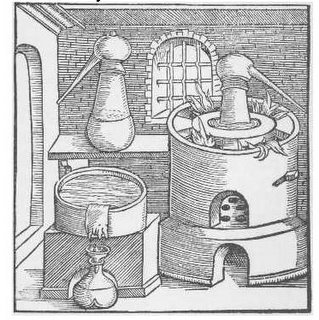
Around the year 1000, there were many great civilizations in the world--the Sung Dynasty in China, the Heian era in Japan, the Mayans in Central America and the great pan-Islamic world, ranging from Al-Andalus (Spain) to Persia. Far back in line was the gruesome hellhole that was Western Europe--riven by endless petty wars, a technological and cultural backwater, routinely enduring famines, plagues, etc.
The Arabs, during this time, were experimenting with distilling, not really to see if they could get drunk faster (Islam, of course, forbids drinking alcohol) but to discover possible remedies. Distilling is basically vaporizing a liquid and then recondensing it, so as to separate a liquid into its constituent parts. Once considered near-miraculous, the process is now a staple endured by bored high school students (that is the fate of most things--Shakespeare, math, etc.)
The 8th Century Arab scholar Jabir ibn Hayyan, the world's first great chemist, routinely applied the distilling process to wine. Here's where things get interesting--when you heat wine, because alcohol has a lower boiling point, it turns to vapor before water does. And so if you then draw off this alcohol-rich vapor and condense it back into liquid, you get something far more alcoholic than wine. And if you keep re-vaporizing the wine and then re-condensing it--eventually you get some really good hootch.
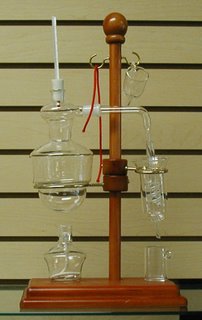
As Europe began slowly reviving in the 12th and 13th centuries, the distilling process began making its way into cultural life, first as a miracle medicine, latterly as a way to get really, really drunk. By 1300, Arnald of Villanova, a French professor, was making grandoise claims for distilled wine, or, as it was called, aqua vitae--the water of life.
(A good chunk of this information comes from, of course, Tom Standage's A History of the World in Six Glasses, the inspiration for this series of posts.)
King: To-day it is our Pleasure to be drunk,
and this our Queen shall be as drunk as Us.
Queen: If the capacious Goblet overflow
with Arrack-Punch--'fore George! I'll see it out;
of Rum, or Brandy, I'll not taste a Drop.
King: Tho' Rack, in Punch, Eight Shillings be a Quart;
And Rum and Brandy be more than Six,
Rather than quarrel, you shall have your Will.
Henry Fielding, Tom Thumb, A Tragedy.
Uisge Beatha
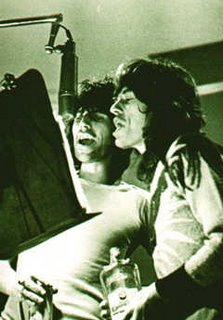
The making of Exile on Main St., brought to you by whiskey and heroin.
"Bartender goes, gets the soda bottle. Squirt, squirt. A blast coming out of it. Whoops. The whiskey shot up the sides of the glass, splashing on the bar.
'Sorry sir.'
'Yes.'
'It's a new bottle.'
'Quite.'
Bartender puts away the bottle and comes back for the money. Stands embarassed in front of Dangerfield...the old men, sensing disaster, turning on their stools to watch.
'Two shillings.'...
'Half my whiskey is on the bar.'
'No trouble now.'
'Would you mind bringing me the bottle to replace the amount splashed in my face.'
J.P. Donleavy, The Gingerbread Man.
Whiskey, its name derived from the Gaelic uisge beatha (aqua vitae), is the classic spirit, at least in music. Lyrics devoted to either celebrating or cursing whiskey are innumerable, and that's just the country songs.
Whiskey (or whisky, depending on where it is distilled) is made by distilling grains, each type of grain leading to its own brand of whiskey (hence, rye whiskey, or malt whiskey (from 100% malted barley, etc.))
"There is nothing like whiskey in this world for presevering a man when he is dead...if you want to keep a dead man, put him in whiskey--if you want to kill a living man, put the whiskey into him."
Dr Guthrie, The Temperance Handbook.
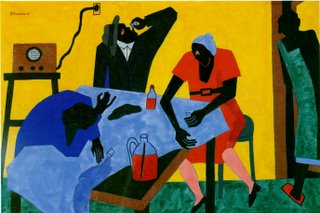
"It Was the Whiskey Talkin' (Not Me)", offered by the Rev. Frost, was recorded in 1990, one of the best Lewis recordings of recent times. It first appeared, of all places, on the soundtrack to Warren Beatty's ill-fated take on Dick Tracy. You can find it on Young Blood (now out of print, it seems, but still cheap.)
The Rev. passes on this bit of information he found (written around the time of recording) about the track:
"The producer, Andy Paley, wrote the song with Jerry Lee in mind more than a decade ago when he was a staff writer for Warner Publishing and Jerry Lee was one of the rulers of country radio. For reasons too obscure and random to recount, the song was not then presented to the Killer. Now Paley is supervising one element of the soundtrack for a film version of the Dick Tracy comic strip, following director and star Warren Beatty's directive that the movie's music should reflect his version of what Chicago radio might have sounded like in the 1930s.
"It Was the Whiskey Talkin' (Not Me)" fits into that niche; it's a pleasant, if not spectacular, trot along the pep side of Bob Wills-style western swing. The blame-the-booze-not-the-boozer lyrics of the song are not particularly convincing, but they do appear custom-made for Jerry Lee's latter-day recording persona. "Think about it," he often says between takes, more as an ominous general warning than as a reference to anything specific."
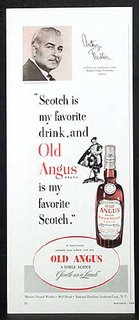
Fats Domino's "Whiskey Heaven", a Big Rock offering, is from another soundtrack--that of 1980's Any Which Way You Can, a biker movie with Clint Eastwood and an orangutan. "Whiskey Heaven" can be found on a number of odd, cut-rate compilations, like this one.
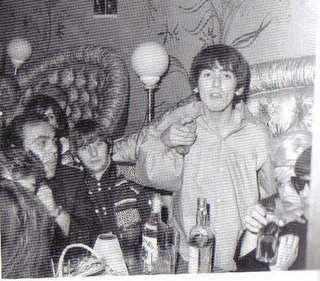
Angry, drunk Beatles (Scotch & Coke men, all), w/Jayne Mansfield, 1964.
Gene Simmons' "Drinkin' Scotch", a Rev. contribution, is from 1956 and can be found on That'll Flat Git It!
The Modeps' "Whiskey and Soda" is also offered by the Rev., who describes it like so:
"The Modeps, a Jamaican popular group in the late sixties (the song
was recorded in 1967), has the place jumping with "Whiskey and soda". What a bass line! And a smashing harrow between alto sax and hammond organ!" I think this band is referred to as "The Mopeds" sometimes--anyone know what's up, besides dyslexia on someone's part? Find it here.
Mountain Dew
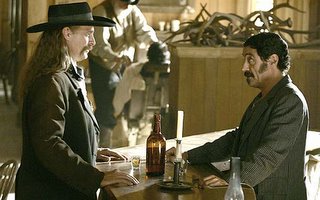
"'Wheyski' was our only drink, as it was on the three days following. We managed however to make a tolerable towdy of it."
Marquis de Chastelleux, Travels (in this case, to backcountry Virginia), 1782.
You could argue whiskey is the United States' national drink. After all, one of the first things that occurred after George Washington became president was the Whiskey Rebellion, essentially a multi-state riot inspired, among other things, by excessive taxes on whiskey. (Americans have their priorities.)
By the mid-1700s, the American backcountry drink of choice--at times, the only drink--was whiskey. And a specific type: Scotch whiskey--that distilled from barley--was replaced by bourbon (from corn or rye), due to a change in popular crops. Everyone drank whiskey in an area like Kentucky or western Virginia; even children were served it at dinner, with a little sugar to sweeten it.
David Hackett Fischer: "Appalachia's idea of a moderate drinker was the mountain man who limited himself to a single quart at a sitting, explaining that more 'might fly to my head'."
And because whiskey could travel well--requiring no cooling, and hence no chance of spoiling--it became the standard drink of the Western U.S. during the 19th Century. The copious amount of whiskey drinking on "Deadwood", for example, is if anything,understated.
Naturally, Prohibition in the 1920s proved a bust with most Americans, who simply turned to bootleggers for their whiskey when the stores could no longer sell it. Moonshining has a long, storied life in the South. Roscoe Holcomb's a cappella version of the traditional ballad "Moonshiner" (or "Moonshine Blues") is from 1961; it's on The High Lonesome Sound. (This version is likely the one Bob Dylan used as a reference for his own take on the song a year later--Dylan was familiar with Holcomb's records.)
In George Jones' "White Lightning", from 1959, home distilling is a Southern family tradition. On Best Of.
And Blind Blake, from 1928, sings about his new bootlegger, who might be trying to kill him. While the song is called "Bootleg Rum Dum Blues", it's mainly about whiskey, as far as I can tell. On All the Published Sides.
And finally, here is an American epitaph: "Whiskey, dope and women done made a wreck of me." Norman Blake's "Whiskey Deaf and Whiskey Blind," a wonderful song (one a few blogs have put up), is from 1999, on Far Away, Down a Georgia Farm.
The Devil Be Done for The Rest
On 25 October 1599, Sir Edward Kennel, commander-in-chief of the English navy, offered to his ships' companies a monster punch which he had prepared in a vast marble basin. For his concoction he used 80 casks of brandy, 1,300 pounds of Lisbon sugar, 5 pounds of nutmeg and 300 biscuits, plus a great cask of Malaga.
A platform had been constructed over the basin to shelter it from the rain, and the serving was done by a ship's boy who sailed on this sea of punch in a rosewood boat. To serve the 6,000 guests one ship's boy had to be replaced by another several times, each one finding himself intoxicated by the fumes from the lake of alcohol at the end of a quarter of an hour.
Larousse Gastronomique.
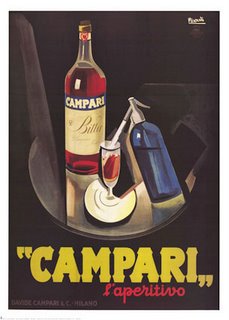
Of the spirits, rum has the most catastrophic history, entwined as it was with the growth of the trans-Atlantic slave trade.
Standage's book goes into detail to explain the origins of rum, short for Rumbullion, which began being produced in Barbados in the 1620s. The great sugar plantations, worked by slaves imported from Africa, were getting underway, and planters soon found they could siphon off the foam produced by boiling sugar cane juice and then distill it to make what was first called Kill-Devil, until it earned the slang name Rumbullion, a South English phrase for a violent commotion (a typical result of too much Rumbullion drinking.)
Rum soon became the grease of the slave trade--given to new slaves to "season" them for their horrific work conditions, and when the New England states began distilling rum themselves, used as a method of payment by slave traders for African slavers. (It became the favored drinks of sailors (mixed with water and lime to make grog) and pirates as well.)
Rum's slave trade roots remained visible in the 20th Century, as rum makers continued to print wildly racist ads. Below, the first shows a weary white woman being served rum by her happy-as-punch menial; the second is a sort of treble-Sambo rum fiesta:
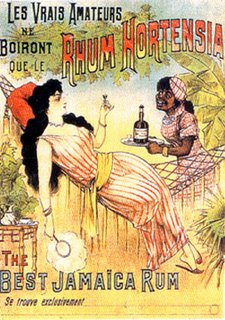
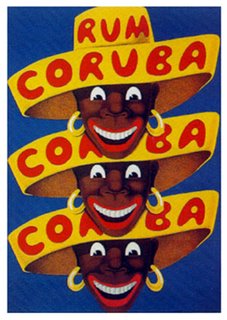
Here is Gwenn Foster and Clarence Ashley's "Bay Rum Blues," in which the singer blames rum for a whole host of missteps. Foster occasionally played with the Carolina Tar Heels, and then made a series of "blues" records for ARC with Ashley in the '30s before vanishing into obscurity. This recording, from 1933, is one of my favorite tracks--both funny and bleak, and featuring some amazing harp playing by Foster.
"Roosevelt was wet
and Hoover was dry
Gimme Bay Rum
and let Hoover by."
I'm not sure what exactly Ashley is referring to when he sings about "the railer's chain"--a chain gang? A job on a railway line? Here's one guess. On Harmonica Blues.
What Magnified Monsters Encircle Therein!
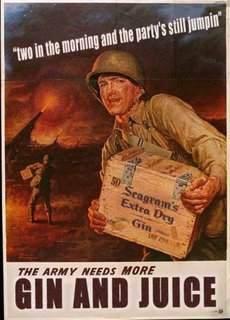
Is there a more malicious drink than gin? Of the spirits, it is the most pitiless. Gin drinking is often referred to in songs as being a sin, a solitary sin best practiced in the dark--it is chaos, bottled misery, a glass of weakness.
Much of this stigma comes from the gin epidemic in England during the 18th Century. Much like the US crack wave of the 1980s, gin was embraced by a desperate underclass and killed a good many of them, while newspaper writers and public officials talked about how dreadful it all was.
It began after William III banned French imports in the 1690s, including brandy (a very popular spirit), while encouraging domestic distilling of cheap products like corn and grains. Out of this turn of events emerged gin (whose name comes from genever, the Dutch name for the juniper berries used to flavor it). Cheap and deadly, it soon became the poor's drink of choice. Bemoaning the public drunkenness and social disaster that gin drinking caused, the ruling class attempted to ban gin several times, only to be met with riots.
The salient image that remains from this period is Hogarth's Gin Lane, in which a mother is so drunk on gin that her infant is tumbling out of her arms:
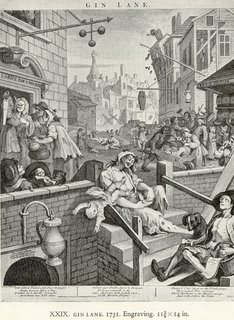
And while the gin craze had abated by the 1750s, gin was still loathed by moralists for years to come. Here is a word-picture poem that appeared in Punch in 1843, which begins "Gin! Gin! A glass of Gin! What magnified monsters encircle therein!" (click on image to enlarge):
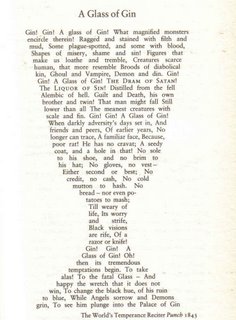
A century of gin songs:
"Any bootlegger sure is a pal of mine." That said, Bessie Smith didn't drink gin ("Bessie would say anything sealed made her sick"). "Me and My Gin", from 1928, is on Complete Recordings Vol. 4.
Champion Jack Dupree's "You've Been Drunk" finds Jack's woman showing up in the morning, stinking drunk, with foul breath, and "hair all nappy". It's the gin again. From 1945 (thanks to Big Rock for this masterpiece). On Rum Cola Blues.
Nina Simone's brilliant "Gin House Blues" is from 1961. On the Colpix Years.
and Snoop Dogg's "Gin and Juice", from 1993. Pure hedonism, and a good chunk of misogyny too. On Doggystyle.
Martinis
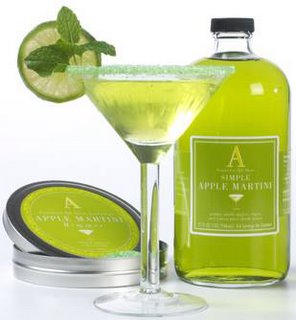
That said, gin remains a popular cocktail. Which do you prefer, a gin or vodka martini? Brian at Big Rock has a strong preference for gin martinis, to put it mildly. Let him explain:
"Anyway, Gin versus Vodka. It's real simple. There is no such thing as a Vodka Martini. If there is vodka involved, it's not a damn martini. A martini is gin, three olives, up. Dirty's ok, too, but you'll need to specify. One takes a bottle of vermouth, walks about five feet away from the martini glass, opens the bottle of vermouth, waves it in the general direction of the martini glass, then closes the bottle. Shaken or stirred is a matter of choice. That's a martini.
This vodka ridiculousness is a creation (conspiracy?) of the vodka bottling companies to sell more of their fruit and candy flavored bastardazations of vodka. There's nothing worse than a martini bar. You go in, and the menu of martini choices is a mile long, all containing flavored vodkas and other ridiculous concoctions. Nowhere on the menu do their fake martinis contain the slightest whiff of gin. These people are idiots, and the trendy morons who go to martini bars need to be locked away for crimes against alcohol.
Even bartenders have taken the bait. Every bar I go to, I ask the bartender what he would serve me if all I asked for a martini. Almost every response starts with, "Well, I'd ask you what kind of vodka you wanted in it." Shame. Shame Shame Shame on the once proud men and women representing the face and hands of our consumption.
I don't care if people want to drink fruity drink concoctions. That's their right. It's a good way to get sorority girls drunk. I know gin has fallen out of favour over the years (mother's milk 'n' all that). But just because it's in a martini glass, that does not make it a martini. If I poured orange juice into a beer stein, does that make it beer? You know the answer. If you know someone caught in the clutches of this evil vodka "martini" heresy, and intervention is in order. Make Dean Martin proud."
Amen! Here's Odgen Nash, to further the point:
There is something about a Martini
a tingle most remarkably pleasant;
a yellow, a mellow Martini,
I wish that I had one at present.
There is something about a Martini,
Ere the dining and dancing begin,
and to tell you the truth,
it's not the vermouth--
I think that perhaps it's the gin.

That said, there is one strong advocate for the other side. James Bond's shaken-not-stirred martinis are vodka martinis (medium dry). Bond would not appreciate today's vodka martini, though, as often they are served with hardly any vermouth. In Live and Let Die, Solitaire attempts to make Bond's drink: "I hope I've made it right. Six to one sounds terribly strong."
Tobin Sprout (formerly of Guided by Voices) offers his instrumental take on martinis--found on 2003's Lost Planets and Phantom Voices. Get it on Luna Music or the regular corporate way.
Vodka and Tequila: the Antipodes
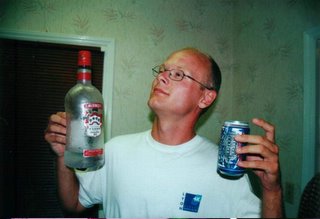
"Just fancy, they gave me drink, fed me! Such bread, it was exquisite! Délicieux! And the vodka, I never tasted any better. And they would not take a penny for anything. And they kept saying: ‘Excuse our homely ways.'
‘What should they take anything for? They were entertaining you, to be sure. Do you suppose they keep vodka for sale?’ said the soldier, succeeding at last in pulling the soaked boot off the blackened stocking."
Leo Tolstoy, Anna Karenina.
There is neither time nor space to really delve into other types of spirits, so let's just briefly touch on a pair of the most popular.
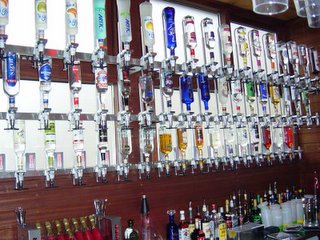
Vodka's central space in today's barroom is a far more recent development than you'd think--vodka was considered a strange indulgence of the Russians and Poles for centuries until the 1950s, when, at the height of the Cold War, ad executives decided to sell Americans on the drink of their alleged mortal enemies. It worked, partly because it fit the mood of the time--a flavorless, odorless spirit that could mix with all sorts of exotics.
From 1957, just when vodka was taking off, comes John Coltrane and Paul Quinichette's "Vodka". On Cattin' With...
First we had some whiskey,
then we drank some gin,
Then we drank tequila
and that's what did me in.
The Pogues, Boat Train.
And, of course, there's tequila, the longtime killer of college students and honeymooners venturing into Mexico. Made by distilling the agave plant, Tequila is a type of mezcal produced in the Mexican state of Jalisco, deriving its name from a town there.
"Tequila", by the Champs from 1958, is the classic tequila song, but there are tons of others. Find Tequila on one of many, many cheap compilations.
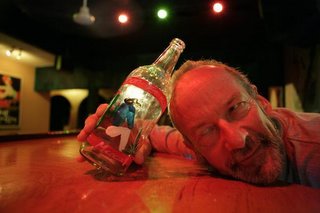
We're about halfway through our series now. Thanks again to Tom Standage, to Thomas and Brian (once more), to the Faber Book of Drink, Drinkers and Drinking (a source for lots of the quotes used).
Favorites?
Scotch: Dunhills.
Gin: Gordon's.
Rum: None. Makes me ill.
Vodka: Smirnoff.
Tequila: See rum.
Next: Time to sober up, people.
No comments:
Post a Comment